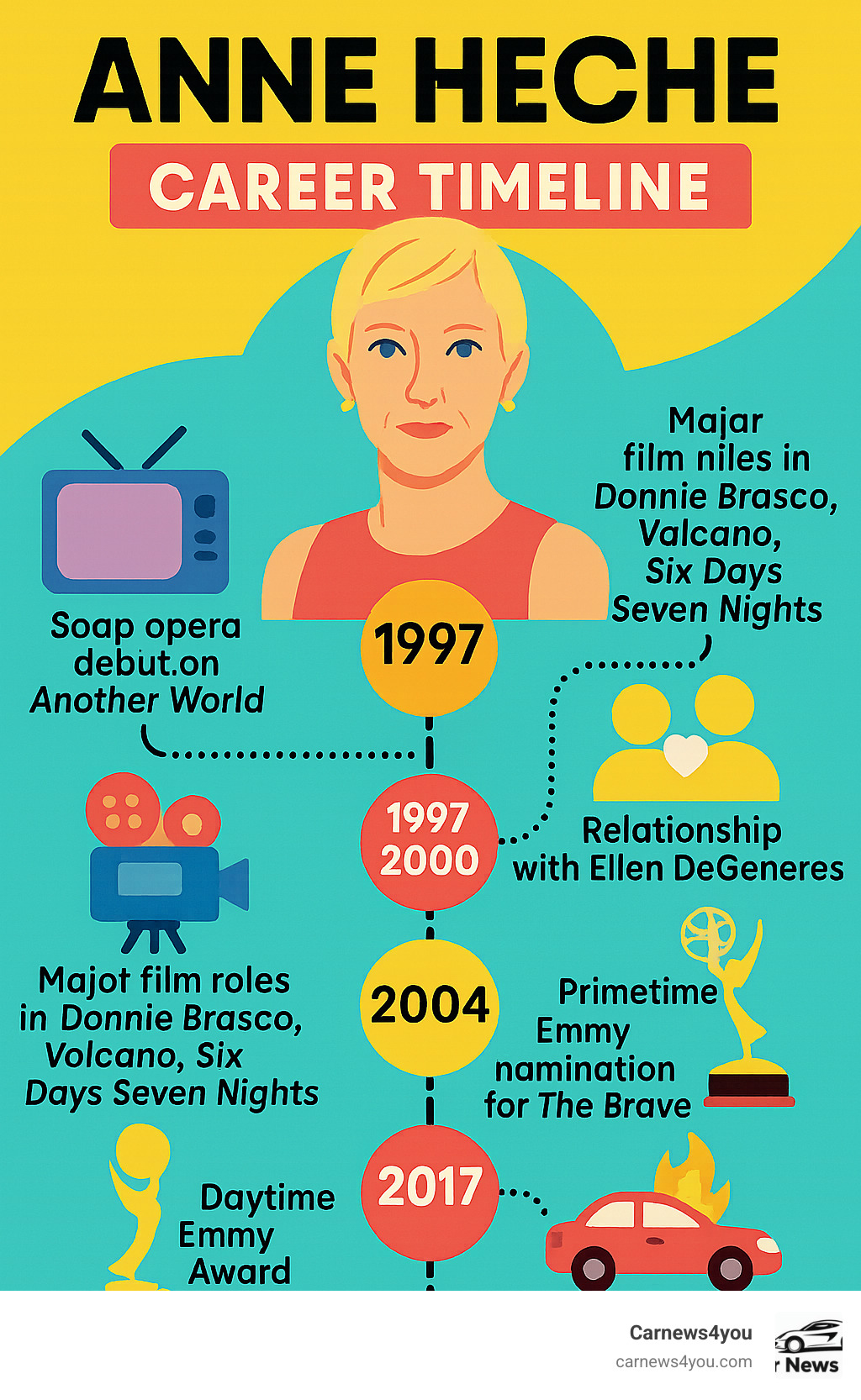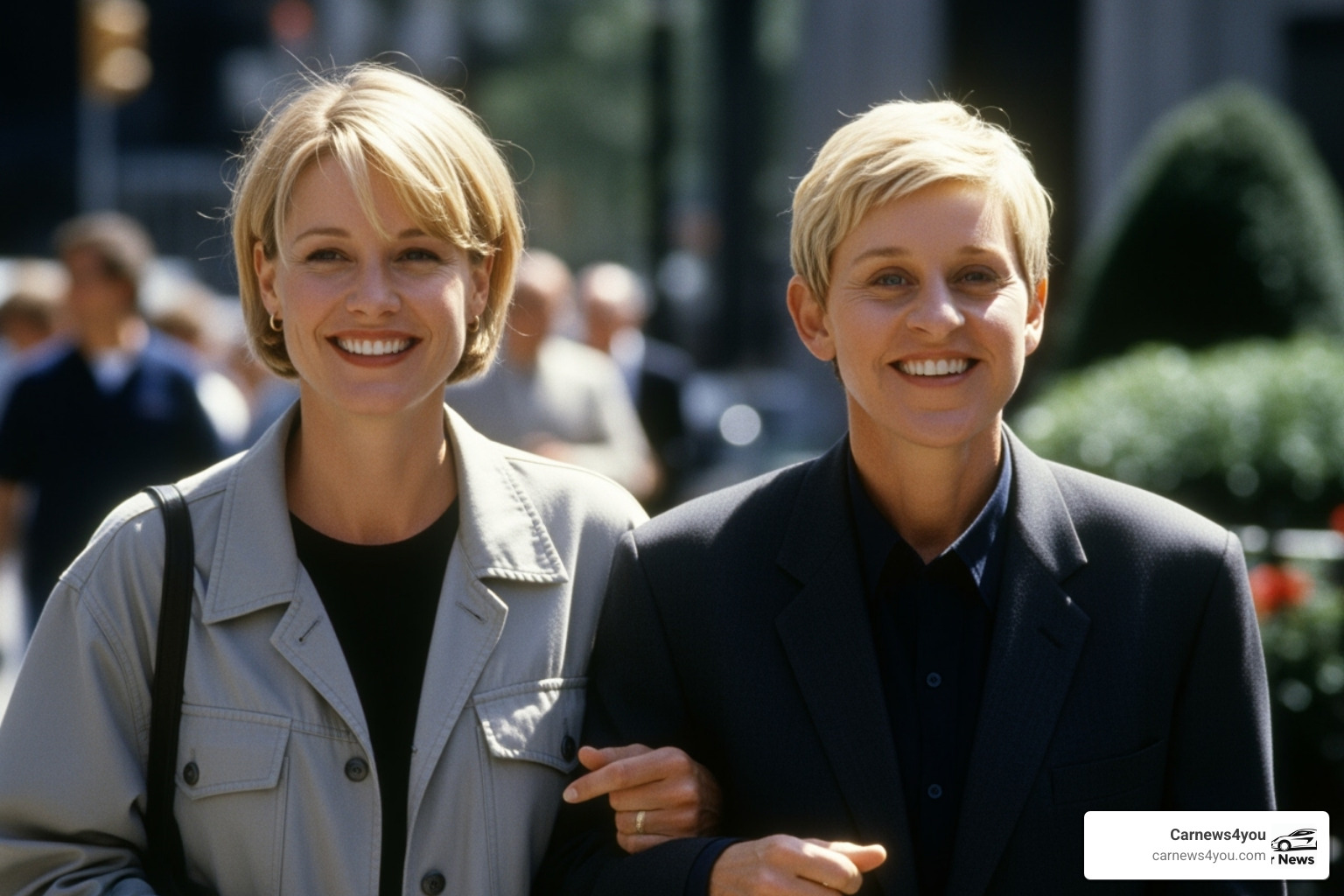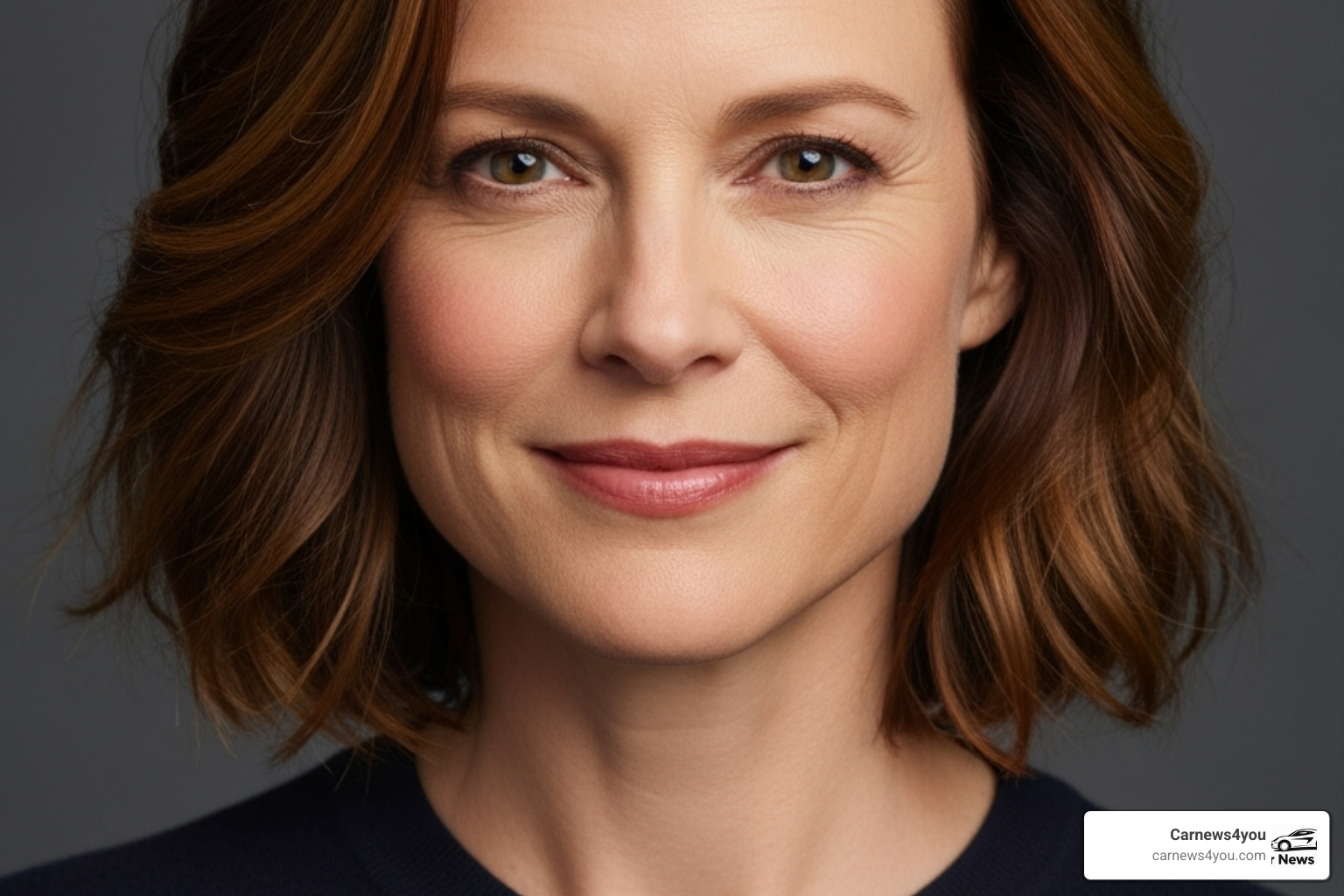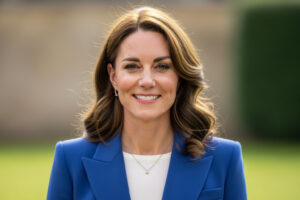Anne Heche: Tragic Life & Legacy 2022
Who Was Anne Heche: The Actress Who Changed Hollywood
Anne Heche was an American actress, writer, and director who died tragically in August 2022 at age 53. She rose to fame in the 1990s with major Hollywood films and became a trailblazer for LGBTQ+ representation through her high-profile relationship with Ellen DeGeneres.
Quick Facts About Anne Heche:
- Born: May 25, 1969, in Aurora, Ohio
- Died: August 11, 2022, in Los Angeles (car crash)
- Career: Actress, writer, director (1987-2022)
- Major Films: Donnie Brasco, Volcano, Six Days Seven Nights, Psycho
- Awards: Daytime Emmy winner, Tony and Primetime Emmy nominee
- Children: Two sons – Homer Laffoon and Atlas Heche Tupper
- Net Worth: Approximately $400,000 at time of death
Heche’s life was marked by both professional success and personal struggles. She started on the soap opera Another World, winning a Daytime Emmy Award. Her breakthrough came in 1997 with starring roles in major films like Donnie Brasco and Volcano.
Her relationship with Ellen DeGeneres from 1997 to 2000 made headlines and broke barriers, but Heche later claimed it hurt her career. She faced mental health challenges throughout her life, writing about her traumatic childhood in her memoir Call Me Crazy.
The actress continued working steadily in film and television until her death. She died from injuries sustained in a high-speed car crash in Los Angeles on August 5, 2022. Her car crashed into a home, causing a fire that left her with severe burns and brain injury.

A Prolific and Acclaimed Career on Screen and Stage
Anne Heche built an impressive career that spanned over three decades, showcasing her remarkable talent across soap operas, blockbuster films, television dramas, and even Broadway stages. Her journey from daytime TV to Hollywood stardom reveals an actress who never shied away from challenging roles or new creative ventures.

Early Career and Rise to Fame for Anne Heche
Anne Heche’s path to stardom began in 1987 when she landed her breakthrough role on the NBC soap opera Another World. At just 18 years old, she took on the complex dual role of twins Vicky Hudson and Marley Love – a challenging assignment that would have intimidated many seasoned actors.
Her natural talent shone through immediately. The role earned her a Daytime Emmy Award in 1991, along with two Soap Opera Digest Awards. This early recognition wasn’t just about pretty faces – Anne Heche proved she could handle complex storylines and bring depth to her characters.
During these formative years, she also appeared in various TV movies and smaller film projects. Each role helped her sharpen her skills and build connections in the industry. By the mid-1990s, it was clear that Anne Heche was ready for her Hollywood breakthrough – and Hollywood was ready for her.
Navigating Hollywood: Major Film and TV Roles
The year 1997 became Anne Heche’s golden moment in cinema. She didn’t just appear in one major film – she starred in several, proving her versatility across different genres.
Her performance in Donnie Brasco alongside Johnny Depp earned critical acclaim and remains her highest-rated film with an impressive 88% on Rotten Tomatoes. That same year, she faced volcanic disaster in Volcano, steerd political intrigue in Wag the Dog, and survived teenage terror in I Know What You Did Last Summer.
The momentum continued into 1998 with Six Days, Seven Nights, where she starred opposite Harrison Ford in this romantic trip. She also took on the iconic role of Marion Crane in Gus Van Sant’s controversial remake of Psycho. While not all these films were box office hits, they established Anne Heche as a bankable leading lady.
Her television work proved equally impressive. Anne Heche earned an Emmy nomination for her powerful portrayal of a drug-addicted mother in the Lifetime movie Gracie’s Choice in 2004. She also stepped onto Broadway, earning a Tony Award nomination for Best Actress in the 2004 revival of Twentieth Century.
Even during challenging personal periods, Anne Heche continued working steadily. Her starring role in the dramedy series Men in Trees from 2006 to 2008 marked a successful return to television. She brought her talents to popular shows like Hung, Chicago P.D., Quantico, and The Brave. In 2020, she even showed her lighter side by competing on Dancing with the Stars.
Beyond Acting: Writing and Directing
Anne Heche wasn’t content to just act – she had stories to tell from behind the camera and on the written page. In 2001, she published her first memoir, Call Me Crazy, a brutally honest look at her traumatic childhood and mental health struggles.

Written in just six weeks, the book revealed her creation of an alter ego named “Celestia” and detailed experiences so intense that Barbara Walters called her 2001 interview about it the “weirdest” she’d ever conducted. A second memoir, Call Me Anne, was published after her death in 2023.
Her directing work focused on meaningful projects close to her heart. She directed a segment of HBO’s If These Walls Could Talk 2 in 2000, exploring lesbian relationships across different time periods. She also contributed to Showtime’s On the Edge in 2001.
Anne Heche took on producer and writer roles for projects like Bad Judge, Save Me, and Stripping for Jesus. In her later years, she acceptd podcasting, co-hosting “Better Together” where she connected with audiences on a more personal level.
Her diverse creative output showed that Anne Heche was never satisfied with just one form of artistic expression. For more insights into entertainment industry stories and celebrity projects, you can explore more info about entertainment news on Carnews4you.
The Tumultuous Personal Life of Anne Heche
Behind the bright lights and red carpets, Anne Heche’s personal life was a complex mix woven with profound struggles, groundbreaking love, and unwavering courage. Her story reminds us that even Hollywood stars face deeply human challenges that shape who they become.
A Traumatic Upbringing and Its Influence
Anne Heche entered this world on May 25, 1969, in Aurora, Ohio, as the youngest of five children. What should have been a loving family environment was anything but stable. Her deeply religious, fundamentalist Christian family moved 11 times before she turned 12, creating a childhood without roots or security.
The trauma ran much deeper than frequent relocations. Anne Heche courageously spoke about suffering extensive sexual abuse by her father from infancy until age 12. Her mother disputed these claims, but Heche stood by her truth. She described growing up in what felt like a cult-like religious environment, watching her father struggle with his closeted homosexuality until his death from AIDS at age 45.
These experiences left lasting scars on her mental health. Anne Heche was remarkably open about her psychological struggles, including a highly publicized breakdown after her relationship with Ellen DeGeneres ended. She once said she was “insane for the first 31 years of her life,” creating an alter ego named “Celestia” and sometimes believing she was from another planet.
Her journey toward healing wasn’t easy. She explored various treatments, including what she described as beneficial LSD therapy. Despite the darkness of her early years, Anne Heche transformed her pain into advocacy for mental health awareness. “I had to live through a lot of life to get to the place where I am now,” she reflected. “I had to see truths and work through shame, and I’m very grateful for every step that I took.”
A Groundbreaking Relationship and Its Aftermath
In 1997, Anne Heche began a relationship that would change both her life and Hollywood history. Her romance with comedian and talk show host Ellen DeGeneres lasted until 2000, but its impact stretched far beyond those three years. They became what many called the “first gay supercouple” at a time when being openly gay in Hollywood was career suicide.

Their public appearances, like walking the red carpet at the Volcano premiere, made headlines worldwide. Anne Heche was breaking barriers and giving visibility to LGBTQ+ relationships in entertainment. However, this courage came with a steep price tag.
She later revealed that the relationship led to her being “blacklisted” from major Hollywood projects. A $10 million film deal vanished, and she was told directly: “You’re not getting a job because you’re gay.” The bewilderment in her voice was clear when she said, “How could that destroy my career? I still can’t wrap my head around it.”
Despite the professional setbacks, Anne Heche never regretted her choice to love openly. She received GLAAD’s Stephen F. Kolzak Award in 2000 for promoting acceptance and advancing LGBTQ+ representation during a particularly challenging time in Hollywood. When the relationship ended, she noted that their goals had diverged – she sought love while believing Ellen prioritized wealth.
Marriages, Children, and Later Relationships
After her split from Ellen DeGeneres, Anne Heche found new love and acceptd motherhood. In 2001, she married cameraman Coleman ‘Coley’ Laffoon. Their marriage brought joy in the form of their son Homer Laffoon, born in 2002. The couple divorced in March 2009, but their co-parenting relationship continued.
Romance found Anne Heche again with actor James Tupper, her co-star from Men in Trees. Their relationship began shortly after her divorce and brought another blessing – son Atlas Heche Tupper, born in March 2009. The couple shared 11 years together before separating in 2018.
Following her tragic death, settling her estate became complicated. Homer Laffoon was named the permanent special administrator, but the process wasn’t smooth. James Tupper contested this role, claiming a 2011 email was Anne Heche’s unsigned will. The estate faced approximately $6 million in claims from various creditors, including the homeowner and renter affected by her fatal crash, and even ex-partner Thomas Jane for an unpaid loan.
With her estate valued at just $400,000 at the time of her death, these financial challenges made settlement particularly difficult. Homer has been working diligently to resolve these matters, expressing cautious hope for fair resolutions without lengthy court battles. Through it all, Anne Heche’s legacy as both a talented performer and devoted mother remains intact.
The Tragic Death of a Hollywood Star
The entertainment world lost a remarkable talent when Anne Heche died tragically in August 2022. Her sudden passing at just 53 years old marked the end of a life filled with both extraordinary achievements and personal battles.
The August 2022 Car Crash
August 5, 2022, started like any other day, but it would become the beginning of the end for Anne Heche. That morning, she was driving her blue Mini Cooper through the Mar Vista neighborhood of Los Angeles when something went terribly wrong.
Witnesses and security cameras captured disturbing footage of her driving erratically at high speed. She first crashed into the garage of an apartment complex but somehow managed to drive away from that initial collision. Tragically, this was only the beginning.
Moments later, Anne Heche crashed with devastating force into a residential home. The impact was so severe that both her car and the house immediately burst into flames. The crash created an inferno that would take 59 firefighters a grueling 65 minutes to extinguish.
When emergency responders finally managed to extract her from the wreckage, Anne Heche had suffered catastrophic injuries. She had severe burns covering much of her body and had sustained an anoxic brain injury from smoke inhalation. Paramedics rushed her to Ronald Reagan UCLA Medical Center before transferring her to the specialized Grossman Burn Center.
From the moment she arrived at the hospital, she remained in a coma. Despite the medical team’s best efforts, her condition never improved. You can find more details about this tragic incident in our Carnews4you report on the crash.
Official Cause of Death and Aftermath for Anne Heche
After six days of fighting for her life, Anne Heche was declared legally brain dead on August 11, 2022. However, her family made the compassionate decision to keep her on life support for three additional days to honor her wishes regarding organ donation. She finally passed away on August 14, giving the gift of life to others even in her final moments.
The Los Angeles County Medical Examiner-Coroner conducted a thorough investigation into her death. They officially ruled it an accident, with the primary cause listed as inhalation and thermal injuries from the fire. A sternal fracture was also noted as a contributing factor to her death.
The toxicology report revealed some important details. While inactive cocaine metabolites were found in her system, there were no active drugs present at the time of the crash. This meant that Anne Heche was not under the influence of illegal substances when the accident occurred. For complete details on these findings, check out our Carnews4you coverage of coroner’s report.
Her sons, Homer and Atlas, faced the heartbreaking task of saying goodbye to their mother. Homer shared a touching statement, expressing his hope that she had found “eternal freedom” from the pain that had followed her throughout life. They chose Hollywood Forever Cemetery as her final resting place, feeling it was fitting for someone who had given so much to the entertainment industry.
The outpouring of grief from Hollywood was immediate and heartfelt. Colleagues like Robert De Niro, Alicia Silverstone, and Carrie Ann Inaba shared memories of Anne Heche’s vibrant spirit and incredible courage. They remembered not just her talent as an actress, but her bravery in living authentically when it wasn’t easy to do so.
Her death marked the end of a complex and fascinating life – one filled with triumph, struggle, and an unwavering commitment to truth.
Frequently Asked Questions about Anne Heche
People often ask us about Anne Heche’s most memorable work and personal life. Here are the answers to the questions we hear most frequently about this talented actress.
What were Anne Heche’s most famous movies?
Anne Heche became a household name through her incredible performances in several blockbuster films during the late 1990s. Her most celebrated role was in the crime drama Donnie Brasco (1997), where she starred alongside Johnny Depp and Al Pacino. This film earned an impressive 88% rating on Rotten Tomatoes and remains her highest-rated movie.
That same remarkable year, she captivated audiences in the disaster thriller Volcano (1997) and showcased her comedic timing in the political satire Wag the Dog (1997). The following year brought us one of her most commercially successful films, Six Days, Seven Nights (1998), where she held her own opposite Harrison Ford in this romantic trip.
Anne Heche also made headlines with her bold performance in Gus Van Sant’s controversial 1998 remake of Alfred Hitchcock’s Psycho. While this film divided critics, it demonstrated her willingness to take on challenging and unconventional roles that other actresses might have avoided.
Who are Anne Heche’s children?
Anne Heche was a devoted mother to two wonderful sons who meant everything to her. Her eldest son, Homer Laffoon, was born on March 2, 2002, during her marriage to cameraman Coleman ‘Coley’ Laffoon. Homer grew up to be a responsible young man who later took on the difficult task of managing his mother’s estate after her passing.
Her younger son, Atlas Heche Tupper, was born on March 7, 2009, from her long-term relationship with actor James Tupper, whom she met on the set of Men in Trees. Both boys were the light of Anne Heche’s life, and she often spoke about how much joy they brought her during both good times and difficult periods.
After her tragic death, both sons showed remarkable strength in honoring their mother’s memory while dealing with the complex legal matters surrounding her estate.
What was the controversy surrounding Anne Heche and Ellen DeGeneres?
The relationship between Anne Heche and Ellen DeGeneres was both groundbreaking and professionally costly. From 1997 to 2000, they were together during a time when Hollywood was far less accepting of LGBTQ+ relationships. They became what many consider the first major openly gay female celebrity couple, breaking barriers and paving the way for future representation.
However, Anne Heche later revealed that this visibility came with a devastating professional price. She claimed that being in such a public same-sex relationship led to her being “blacklisted” by Hollywood executives. According to Heche, she lost major movie opportunities, including a lucrative $10 million picture deal.
The impact was immediate and harsh. Anne Heche recalled industry professionals telling her directly, “You’re not getting a job because you’re gay.” She struggled to understand how her personal life could so dramatically affect her professional opportunities, saying she still couldn’t wrap her head around the industry’s reaction.
Despite the career setbacks, Anne Heche never regretted standing in her truth. She received GLAAD’s Stephen F. Kolzak Award in 2000, recognizing her courage in promoting LGBTQ+ acceptance during a time when it required real bravery to be visible. Her relationship with Ellen may have ended, but her contribution to representation in Hollywood remains an important part of her legacy.
Conclusion
Looking back at Anne Heche’s remarkable journey, we’re reminded of a woman who refused to be anything less than authentic. Her life story reads like a Hollywood screenplay – filled with triumph, heartbreak, and an unwavering commitment to living her truth, no matter the cost.
Anne Heche leaves behind a lasting legacy that extends far beyond her impressive filmography. As a versatile talent, she proved time and again that she could inhabit any character, whether it was the complex dual role that launched her career on Another World or her memorable performances in blockbusters like Donnie Brasco and Six Days, Seven Nights. Her work earned her critical acclaim and numerous nominations, cementing her place as a respected actress across film, television, and stage.
Perhaps even more importantly, Anne Heche was a trailblazer who helped pave the way for LGBTQ+ representation in Hollywood. Her relationship with Ellen DeGeneres may have cost her professionally, but it opened doors for countless others who came after her. She received GLAAD’s Stephen F. Kolzak Award for good reason – her courage to live openly helped change an industry that desperately needed changing.
Her advocacy for mental health awareness was equally powerful. Through her raw and honest memoirs, Call Me Crazy and the posthumous Call Me Anne, she showed incredible vulnerability in sharing her traumatic childhood and journey toward healing. Her willingness to discuss her struggles with mental health helped reduce stigma and inspired others facing similar battles.
Even after her tragic passing, Anne Heche’s work continues to reach audiences through posthumous projects like Girl in Room 13 and Wildfire: The Legend of the Cherokee Ghost Horse. These final performances serve as bittersweet reminders of the talent the world lost too soon.
The complexity of Anne Heche’s life – the soaring highs and devastating lows – makes her story all the more human and relatable. She faced her demons head-on, never shying away from difficult conversations or uncomfortable truths. Her resilience in the face of adversity continues to inspire, and her unique voice in Hollywood will not be forgotten.
We’re honored to have shared her story with you, celebrating both her professional achievements and personal courage. Anne Heche may be gone, but her impact on entertainment and society will endure.
For more compelling narratives and insights into the lives of your favorite stars, we invite you to Explore more celebrity stories on Carnews4you.







